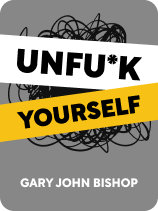

This article is an excerpt from the Shortform book guide to "Unfu*k Yourself" by Gary John Bishop. Shortform has the world's best summaries and analyses of books you should be reading.
Like this article? Sign up for a free trial here.
Want to know how to stop holding yourself back with negative thoughts? How do negative thoughts limit us?
According to author and life coach Gary John Bishop, the way you think dictates your reality. To learn how to break free of negativity and stop holding yourself back, you have to first learn to reframe your mindset, which Bishop helps his readers do in his book Unfu*k Yourself.
Read on to learn how to stop holding yourself back with negative thoughts, according to Bishop’s advice.
Stop Holding Yourself Back: Coping With Negative Thoughts
In Unfu*k Yourself, author and life coach Gary John Bishop introduces phrases designed to combat common negative thought patterns, teaching you how to stop holding yourself back and instead be more action-oriented in life. He calls these phrases “personal assertions,” but in this article, we’ll refer to them as “power statements.”
Bishop says that if you incorporate these power statements into your self-talk, they’ll empower and motivate you to create the life you want. According to him, there are two steps to achieving freedom from the thoughts that are holding you back:
- Step 1) Stop whatever you’re doing that’s keeping you stuck.
- Step 2) Start doing the things that will get you where you want to go.
In this article, we’ll introduce two of the power statements in Bishop’s book that help you to stop holding yourself back (step one).
Your Brain Wants to Be Right
Power statement: “I am wired to win.”
Best used: To motivate you to change your beliefs
According to Bishop, this power statement serves to remind you that what you believe internally will determine the life you build externally. By “wired to win,” Bishop means that our brains are set up to prove themselves right, subtly directing you to create a reality that confirms your unconscious beliefs. Therefore, in order to achieve the life you want, you’ll need to make sure you have the beliefs to match, even at the unconscious level.
(Shortform note: Although Bishop’s word choice—”I am wired to win”—sounds affirming and positive, it’s more nuanced. Bishop uses the word “win” to make the point that your mind ensures you bring all your beliefs to fruition, regardless of what those beliefs are. If you unconsciously believe you’re a loser, your life will reflect that—and in proving you right, technically you’ll be winning at being a loser. So rather than an affirmation, “I am wired to win” is more of a warning, as in, “Remember that your deepest beliefs will come true, so you better get to work on shifting them to align with your goals.”)
To use this power statement to stop holding yourself back, ask yourself what you want your life to look like, then consider what beliefs would be confirmed by that life. Specifically, Bishop says to consider an area of your life where you’re struggling or feeling stuck, and ask yourself what belief is proven right by your current situation. For example, if you always seem to be broke, ask yourself what opinion that confirms. You may discover a belief that you need someone else to take care of you, or that financial success would alienate you from the people you love, or that stability would be boring.
Once you can spot the beliefs that are holding you back, Bishop says, you should try to stop believing in those negative beliefs and replace them with new ones by focusing on your goals, imagining the steps and actions that will be required along the way, and considering what mindset you will need to successfully perform those actions at each stage.
It Is What It Is (Not What It Should Be)
Power statement: “I expect nothing and accept everything.”
Best used: To challenge your expectations
Another aspect of your unconscious mind that plays a big role in holding yourself back is your expectations. Without being aware of it, we hold expectations about what should happen or how we thought things would go, and we’re constantly comparing reality to that ideal. Again, Bishop instructs, consider an area of your life that isn’t going well, and you may discover that your dissatisfaction is a result of expectations you’re unaware you were holding. He recommends writing down what you thought this part of your life would look like, and then writing down a description of how it actually is. The gap between the two is most likely what’s making you unhappy.
(Shortform note: Bishop’s power statements, as well as the thinkers he chooses to quote throughout the book, suggest he draws inspiration from stoic philosophy as found in books such as Ryan Holiday and Stephen Hanselman’s The Daily Stoic. In particular, the concept of “expect nothing and accept everything” closely mirrors the stoics’ view that you should closely observe and examine your assumptions, and that the best approach is to receive life as it is, without wanting it to be different.)
Maybe you expected that by your age you would have achieved certain career milestones, but they’re still far off, or you ended up in a different career entirely. Maybe your vision of what it would be like to have a baby isn’t matching up with your reality now that you have one. Bishop says if you could let go of the expectations, you wouldn’t be struggling. You could just respond to what’s really happening in your life. He clarifies that accepting everything doesn’t mean that you don’t have goals or make plans to achieve them—but instead that you leave room for flexibility so that you can respond to your experience on its own terms, rather than comparing it to an ideal that doesn’t exist.
In encouraging you to revisit your expectations, Bishop employs a similar logic as he does when discussing unwillingness. Though Bishop doesn’t explicitly connect the two ideas, they both assume you can stop holding yourself back and improve your well-being by setting aside what you feel you should do in favor of a more accurate assessment of what you truly intend to do.
| How to Let Go of Your Expectations In Solve For Happy, Mo Gawdat elaborates on the idea that your perceptions and expectations determine your happiness. Over the course of the book, Gawdat offers strategies for aligning your perceptions and expectations, and he lays out a multi-step process for replacing common misconceptions that prevent you from being happy with a more supportive framework. This involves: 1) Realizing your inner voice is not your self, so you can choose how to respond to it 2) Being less attached to your physical body, which is also not your self 3) Admitting your knowledge is limited, so being wrong doesn’t have to upset you 4) Letting go of ideas of the past and future in order to be present now 5) Putting in effort while accepting that the results may be beyond your control 6) Challenging your fears instead of believing they keep you safe |

———End of Preview———
Like what you just read? Read the rest of the world's best book summary and analysis of Gary John Bishop's "Unfu*k Yourself" at Shortform.
Here's what you'll find in our full Unfu*k Yourself summary:
- How your mind works and how you can use its power to your advantage
- Why your subconscious mind is actually the one calling the shots
- The seven phrases you can use to reshape your thoughts






